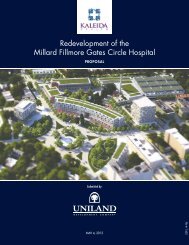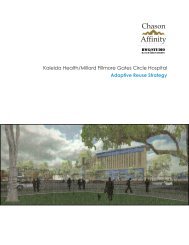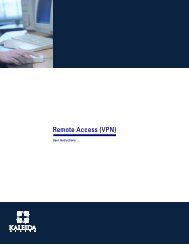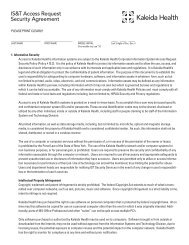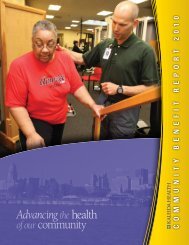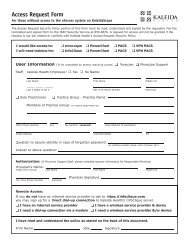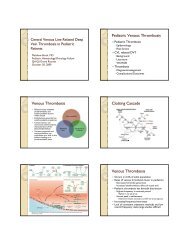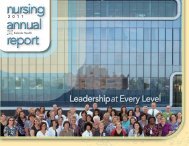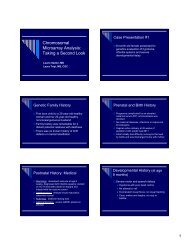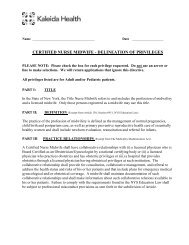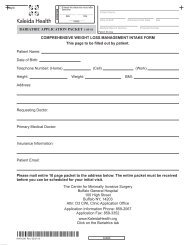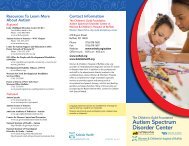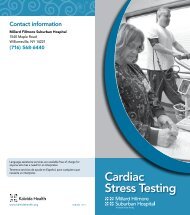Pregnancy and Postpartum Mood Disorders - PDF - Kaleida Health
Pregnancy and Postpartum Mood Disorders - PDF - Kaleida Health
Pregnancy and Postpartum Mood Disorders - PDF - Kaleida Health
Create successful ePaper yourself
Turn your PDF publications into a flip-book with our unique Google optimized e-Paper software.
Treatment<br />
✔ Increase support from those around you.<br />
This may be your spouse/partner, family,<br />
friends, church or babysitters.<br />
✔ Talk to your OB/GYN or your baby’s<br />
pediatrician right away. The sooner you<br />
ask for help, the sooner you’ll begin to<br />
feel better.<br />
✔ Ask for a list of referrals for specialists in<br />
women’s mood disorders. This may<br />
include psychiatrists or therapists.<br />
✔ Let someone else watch your baby so you<br />
can get a break.<br />
✔ Be sure your doctor considers other<br />
medical causes of depression,<br />
such as thyroid imbalances.<br />
✔ Consider<br />
attending a<br />
support group<br />
for women with<br />
postpartum<br />
depression.<br />
Local Treatment Resources<br />
The <strong>Postpartum</strong> Depression Support<br />
Group:<br />
Mom’s -T.E.A.R.S.<br />
(Treatment, Education, Advocacy,<br />
Resources, Support.)<br />
At Millard Fillmore Suburban Hospital<br />
2nd Thursday of the month FREE<br />
Please call (716) 568-3628 to register<br />
Educational<br />
Resources/References<br />
Millard Fillmore Suburban Hospital Childbirth<br />
Education Department<br />
(716)-568-3628<br />
www.kaleidahealth.org/childbirth<br />
The <strong>Postpartum</strong> Resource Center of<br />
New York, Inc.<br />
Toll Free Helpline 1-855-631-0001<br />
(631)-422-2255<br />
www.postpartumny.org<br />
<strong>Postpartum</strong> Support International<br />
www.postpartum.net<br />
warmline: 1-800-944-4PPD (4773)<br />
(telephone support)<br />
<strong>Postpartum</strong> Depression Support Helpline<br />
1-800-773-6667<br />
Father’s Website<br />
www.postpartumdads.org<br />
You are not alone.<br />
You are not to blame.<br />
With help, you will be well.<br />
Cover: artist Annette Darling<br />
Language assistance services are available free of charge for<br />
anyone who has a need for an interpreter.<br />
Tenemos servicios de ayuda en Español, para cualquiera que<br />
necesita un intérprete.<br />
www.kaleidahealth.org<br />
SUB-0342 7/11<br />
<strong>Pregnancy</strong><br />
<strong>and</strong> <strong>Postpartum</strong><br />
<strong>Mood</strong> <strong>Disorders</strong><br />
SUB-342 <strong>Pregnancy</strong> Postpardum 4 panel broch rev.indd 1<br />
8/29/11 9:30 AM
<strong>Postpartum</strong> Depression (PPD) refers to a<br />
wide range of emotional changes a woman<br />
may experience after the birth of a baby/<br />
<strong>Postpartum</strong> depression, anxiety, postpartum<br />
obsessive-compulsive disorder <strong>and</strong> panic<br />
disorder <strong>and</strong> postpartum psychosis are all<br />
recognized as postpartum mood disorders.<br />
Baby Blues<br />
Up to 80% of mothers experience crying,<br />
sadness, worry <strong>and</strong> fatigue in the first two<br />
weeks after delivery. Symptoms usually<br />
resolve on their own. You should ask for<br />
<strong>and</strong> accept help from anyone you feel is<br />
supportive.<br />
<strong>Pregnancy</strong>/<strong>Postpartum</strong><br />
Anxiety<br />
Approximately 6% of pregnant women <strong>and</strong> 10%<br />
of postpartum women develop anxiety. Sometimes<br />
they experience anxiety alone <strong>and</strong> sometimes<br />
they experience it in addition to depression.<br />
Symptoms include:<br />
✔ Constant worry<br />
✔ Feeling that something bad is going to<br />
happen<br />
✔ Racing thoughts<br />
✔ Disturbances of sleep <strong>and</strong> appetite<br />
✔ Inability to sit still<br />
✔ Physical symptoms like dizziness, hot<br />
flashes <strong>and</strong> nausea<br />
<strong>Postpartum</strong> <strong>and</strong> antepartum anxiety are<br />
temporary <strong>and</strong> treatable with professional<br />
help. If you feel you may be suffering from<br />
one of these illnesses, know that it is not your<br />
fault <strong>and</strong> you are not to blame.<br />
Prenatal/<strong>Postpartum</strong><br />
Depression<br />
Within the first year after delivering, 10-20%<br />
of mothers experience a more serious<br />
depression that begins to interfere with their<br />
daily life. Symptoms may include:<br />
✔ Crying<br />
✔ Irritability<br />
✔ Excessive worry<br />
✔ Sleep problems<br />
✔ Rapid weight changes<br />
✔ Difficulty focusing<br />
✔ Lack of joy in life<br />
✔ Not bonding with baby<br />
✔ Suicidal thoughts<br />
This depression is a real illness that may<br />
impair your ability to respond to your baby.<br />
However, this depression is a very treatable<br />
illness <strong>and</strong> there is help available.<br />
<strong>Postpartum</strong> Obsessive<br />
Compulsive Disorder <strong>and</strong><br />
Panic Disorder<br />
These are anxiety-based disorders that occur<br />
in 3-5% of mothers after delivery. Most<br />
commonly, symptoms include overwhelming<br />
worry, recurrent images of harming your<br />
baby, shortness of breath, racing heartbeat<br />
<strong>and</strong> dizziness. These symptoms often<br />
co-occur with depression so treatment<br />
is similar. Mothers recognize these scary<br />
thoughts do not make sense.<br />
Post-Traumatic Stress<br />
Disorder<br />
Approximately 1-6% of women experience<br />
postpartum post-traumatic stress disorder<br />
(PTSD) following childbirth. Most often, this<br />
illness is caused by a real or perceived trauma<br />
during delivery or postpartum.<br />
Symptom of postpartum PTSD<br />
might include:<br />
✔ Intrusive re-experiencing of a past<br />
traumatic event<br />
✔ Flashbacks or nightmares<br />
✔ Anxiety <strong>and</strong> panic attacks<br />
✔ Feeling a sense of detachment<br />
<strong>Postpartum</strong> PTSD is temporary <strong>and</strong> treatable<br />
with professional help.<br />
Regardless of emotional symptoms,<br />
you may find the following<br />
suggestions helpful:<br />
✔ Get plenty of rest<br />
✔ Accept help <strong>and</strong> support from others<br />
✔ Let someone else watch your baby so you<br />
can get a break<br />
✔ Be realistic about life (it’s OK if your<br />
house is a mess)<br />
✔ Exercise if you can<br />
✔ Remember, you will get better!<br />
<strong>Postpartum</strong> Psychosis<br />
This is a psychiatric emergency that occurs<br />
rarely (1-2/1000). Symptoms generally occur<br />
within several weeks of delivery <strong>and</strong> include<br />
confusion, agitation, hallucinations (seeing or<br />
hearing things that are not there) delusions<br />
<strong>and</strong> rapid mood swings. Mothers require<br />
IMMEDIATE medical care.<br />
Emergencies<br />
Buffalo General<br />
Hospital’s Emergency<br />
Room<br />
85 High Street<br />
Buffalo, New York 14203<br />
Erie County<br />
Medical Center<br />
Emergency Room<br />
462 Grider Street<br />
Buffalo, New York 14215<br />
Brylin Hospital<br />
1263 Delaware<br />
Avenue<br />
Buffalo, NY 14209<br />
(716) 886-8200<br />
National Suicide<br />
Prevention Hotline<br />
1-800-273-8255<br />
Crisis Services<br />
24 hour Hotline<br />
(716) 834-3131<br />
SUB-342 <strong>Pregnancy</strong> Postpardum 4 panel broch rev.indd 2<br />
8/29/11 9:30 AM



